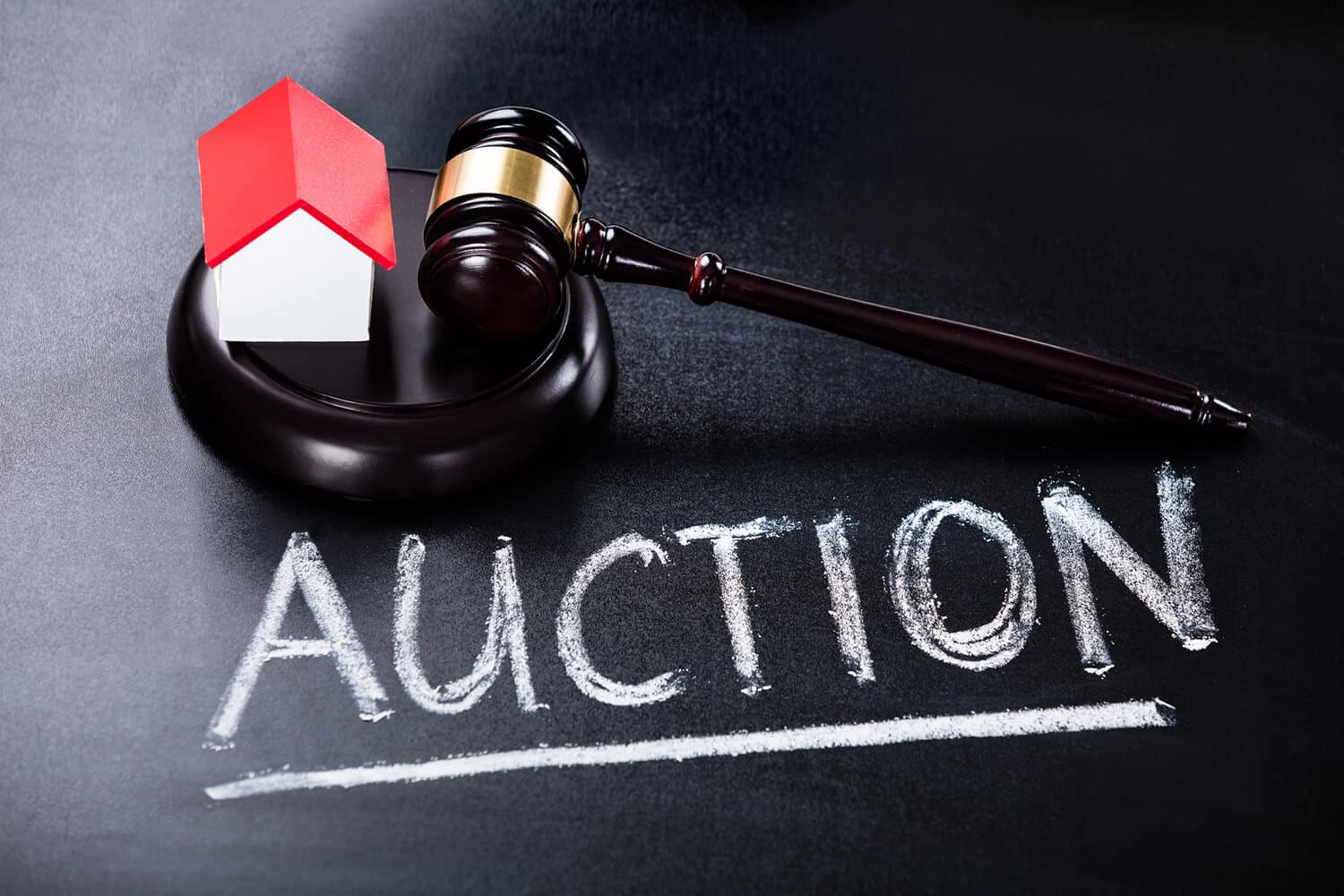Process for Purchasing a Property at Auction in NJ
Secure a Home at Auction with Knowledgeable Legal Counsel in New Jersey

Distinct Forms Property Auctions can Take in New Jersey
1. Foreclosure Auctions
Foreclosure auctions occur when a homeowner defaults on their mortgage, and the lender initiates legal proceedings to recover the unpaid balance by selling the property. In New Jersey, these auctions are typically conducted by the county sheriff’s office. The mortgage loan must be delinquent for no less than 120 days, and the lender must attempt to provide alternatives to the homeowner to prevent foreclosure.
2. Tax Sales
Tax sales occur when property taxes are not paid. There are two kinds of sales. When a property has a tax lien against it, the lien itself can be sold at auction. The highest bidder for the lien then collects what is owed from the homeowner, and if the homeowner does not pay, the lien holder forecloses on the property.n If there is a tax deed sale, the property with the unpaid taxes can be sold directly at auction.
3. Bank-Owned (REO) Properties
When a property doesn’t sell right away at auction, it belongs to the bank. Banks don’t want to keep the property; they want their money. To encourage the property’s sale, they may make some repairs, spruce the place up a little with a coat of paint, or do some minor landscaping to improve the curb appeal; these bank-owned or Real Estate Owned (REO) properties can be inspected, and many times the bank has cleared the title to make the sale more attractive.
4. Estate Sales
Estate sales, often overseen by an executor, are held to liquidate the property for distribution among the heirs or to pay debts owed by the estate. These sales usually have fewer legal issues, but it is important to verify that the seller is authorized to complete the transaction and that all claims to the property by heirs or other parties have been resolved.
Critical Preparation Strategies Before Bidding at Auction
Auctions don’t offer much protection for the buyer, so the devil is in the details. There are steps that can be taken by a potential bidder to prepare for the purchase of a property. The first is a full title search because it will identify any liens against the property or possible co-owners. If possible, get the property inspected; although many auction properties cannot be inspected prior to the sale, it’s worth attempting to view the property’s exterior for foundation issues or roof damage. By consulting with a real estate attorney, you can determine if there are other financial issues, such as unpaid taxes, HOA fees, or hidden liabilities. To use the property for short or long-term rentals or for a business, confirming the zoning laws is a must.
Bird’s Eye View of a New Jersey Property Auction
Before the Auction Begins
Buyers must register before the auction, providing an ID and proof of financial capacity. They must be ready to pay by cash or with a cashier’s check. Some auctions allow financing, but the bidder must have a pre-approved loan amount. Most auctions request a deposit to ensure the bidder’s seriousness.
What the Auction Itself Entails
Auctions are conducted in three ways. An absolute auction occurs when the highest bidder wins without regard to the bid amount. This kind of auction is the most popular for buyers because it benefits them the most. Minimum bid auctions start with a minimum amount, usually the balance owed to the bank or for taxes. Bidders are aware of the minimum bid before going to the auction. A reserve auction allows the seller to reject bids lower than the amount the seller seeks. Auctions often impose a buyer’s premium, which is an additional fee, usually 10% of the winning bid and payable to the auction house.
Important Ways to Calculate the Risk
First-timers at an auction can make careless mistakes, especially when it comes to bidding and budgeting. Knowing how much you can spend and how much the property is worth are vital factors to financial success when purchasing a property at auction. Thorough research of the property and the values of surrounding properties is a good start. If an indoor inspection is possible, it is easier to calculate the cost of renovations. If not, the risk is somewhat higher. The excitement of a bidding war can take you out of your budget, and if you win but cannot pay, you lose your deposit and could be banned from future auctions. Stick to the amount you have or what you have been pre-approved for.
Overcoming Financial Barriers in Property Auctions
Drumming up tens or hundreds of thousands of dollars takes time and preparation. Hard cash loans are good for those who want to flip the property quickly. They provide short-term, high-interest financing suited for investment buyers. Some sellers allow financing through their lenders or if the buyer has been pre-approved for a loan. Another option is delayed financing. The buyer pays cash upfront and immediately procures financing for the property, allowing them to repay any personal loans used for the purchase. But if the property is appraised for more than the buyer is approved for or can pay, the sale is rescinded.
Finalizing Your Purchase After an Auction Victory
A purchase contract must be redacted and signed. It outlines the terms of sale, lists the purchase price, and names the buyer and seller. Payment deadlines and the closing timeline are also listed. Many auction properties are sold without contingencies, but contingencies for financing, inspections, or title issues are sometimes included. The property does not change ownership until the title has been given to the buyer. Title insurance should be purchased after closing to protect the buyer from undiscovered liens during the title search. A title search can also disclose easements, encumbrances, legal claims against the property, or ownership issues.
Several actions must be taken to complete the property transfer and close the sale. If there is a remaining balance, it should be paid. Your real estate attorney should provide a deed of sale, a settlement statement with the costs and fees required for closing, and corresponding loan documents.
Common Challenges When Purchasing a House at Auction in NJ
1. Hidden Problems with the Property
The house’s interior can be much worse than expected, especially if the previous homeowners were upset about having to leave. Removing the tenants can take months and cost thousands in legal fees if the home is still occupied. Even when inspecting the inside, hidden problems such as flooding in high rains or insect infestations can go unseen until it is too late. The house is sold as is, and you should bid accordingly.
2. The Auction Process Itself
During the auction, you could be outbid on a property you were interested in. Furthermore, you could overbid by getting carried away by the emotions of participating in a bidding war. Your drive to beat the other bidder may cause you financial trouble or embarrassment when you have to back out. Inexperience in a fast-paced bidding process against experienced bidders puts you at a grave disadvantage.
3. Buyer’s Remorse
One of the most common risks is buyer’s remorse. Maybe you were unaware of the costly renovations necessary to flip the house or even to move in. Paying too much for a property can affect the equity in your home. If you pay more than the property’s value, it will take longer to rebuild equity.
Talk to a New Jersey Real Estate Attorney who Can Help You Complete Your Auction Purchase with Confidence
Buying a home at auction requires in-depth knowledge of these kinds of transactions. To safeguard your financial interests, consult a real estate attorney at Bronzino Law Firm to review the auction terms and contracts. We can conduct due diligence by investigating the property’s physical condition, zoning issues, title searches, liens, or other encumbrances involving the property to ensure your purchase is worry-free. Our team is here to guide you through every step of the process. Our experience in real estate and property auctions gives you the confidence to take this major financial step.
From our convenient office locations in Brick and Sea Girt, NJ, our firm represents clients in Monmouth County communities like Asbury Park, Red Bank, Long Branch, Freehold, Spring Lake, and Wall Township, as well as Ocean County towns such as Toms River, Jackson, Point Pleasant, Seaside Heights, and Lacey Township. Our job is to protect your interests throughout the process by providing exceptional legal advice, a thorough review of all documents, and key measures to protect your interests along the way. If you would like to know more about buying a property at auction and how an attorney at our firm can make your wishes a reality, call us today at (732) 812-3102 or contact us online.







